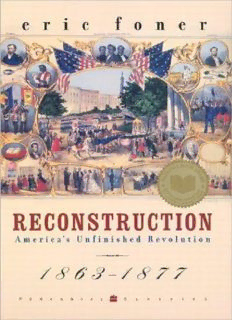
Reconstruction: America's Unfinished Revolution, 1863-1877 PDF
Preview Reconstruction: America's Unfinished Revolution, 1863-1877
Eric Foner RECONSTRUCTION America’s Unfinished Revolution 1863 * 1877 ILLUSTRATED Dedication For Lynn Contents Cover Title Page Dedication Abbreviations Used in Footnotes Editors’ Introduction Preface CHAPTER 1 The World the War Made CHAPTER 2 Rehearsals for Reconstruction CHAPTER 3 The Meaning of Freedom CHAPTER 4 Ambiguities of Free Labor CHAPTER 5 The Failure of Presidential Reconstruction CHAPTER 6 The Making of Radical Reconstruction CHAPTER 7 Blueprints for a Republican South CHAPTER 8 Reconstruction: Political and Economic CHAPTER 9 The Challenge of Enforcement CHAPTER 10 The Reconstruction of the North CHAPTER 11 The Politics of Depression CHAPTER 12 Redemption and After Epilogue Selected Bibliography Index Acknowledgments About the Author Other Books by Eric Foner PRAISE FOR RECONSTRUCTION Copyright About the Publisher Photographic Inserts Notes Abbreviations Used in Footnotes AC—Annual Cyclopedia AgH—Agricultural History AHR—American Historical Review AI HQ—Alabama Historical Quarterly AMA—American Missionary Association ArkHQ—Arkansas Historical Quarterly ASDAH—Alabama State Department of Archives and History CG—Congressional Globe CR—Congressional Record CWH—Civil War History DU—Duke University ETHSP—East Tennessee Historical Society Publications F1HQ—Florida Historical Quarterly FSSP—Freedmen and Southern Society Project, University of Maryland (with document identification number) GaHQ—Georgia Historical Quarterly GDAH—Georgia Department of Archives and History HL—Huntington Library HSPa—Historical Society of Pennsylvania HU—Houghton Library, Harvard University IndMH—Indiana Magazine of History JAH—Journal of American History JEcH— Journal of Economic History JISHS—Journal of the Illinois State Historical Society JMH—Journal of Mississippi History JNH—Journal of Negro History JSH —Journal of Southern History JSocH—Journal of Social History LaH—Louisiana History LaHQ—Louisiana Historical Quarterly LC—Library of Congress LML—Lawson McGhee Library LSU—Louisiana State University MDAH—Mississippi Department of Archives and History MHS—Massachusetts Historical Society MoHR—Missouri Historical Review MVHR—Mississippi Valley Historical Review NA—National Archives NCHR—North Carolina Historical Review NCDAH—North Carolina Division of Archives and History NYPL—New York Public Library Of/Q—Ohio Historical Quarterly PaH—Pennsylvania History PaMHB—Pennsylvania Magazine of History and Biography PMHS—Publications of the Mississippi Historical Society RG 105—Record Group 105: Records of the Bureau of Refugees, Freedmen, and Abandoned Lands RG 393—Record Group 393: Records of the United States Army Continental Commands SAQ—South Atlantic Quarterly SC—Sophia Smith Collection, Smith College SCDA—South Carolina Department of Archives SCHM—South Carolina Historical Magazine SCHS— South Carolina Historical Society SHSW—State Historical Society of Wisconsin SS—Southern Studies SWHQ—Southwestern Historical Quarterly THQ— Tennessee Historical Quarterly TSLA—Tennessee State Library and Archives UGa—University of Georgia UNC—Southern Historical Collection, University of North Carolina USC—South Caroliniana Library, University of South Carolina UTx—Eugene C. Barker Texas History Center, University of Texas VaMHB—Virginia Magazine of History and Biography WMH—Wisconsin Magazine of History WVaH—West Virginia History The New American Nation Series EDITED BY HENRY STEELE COMMAGER AND RICHARD B. MORRIS Editors’ Introduction ROBABLY no other chapter of American history has been the P subject, one might say the victim, of such varied and conflicting interpretations as what attempts to give unity and coherence to the era we call Reconstruction. Even the chronology is chaotic. Did the process begin with the bizarre creation of West Virginia in 1861 —or should that be dated 1863? Did it conclude with the Compromise of 1877 or was its true conclusion Brown v. Topeka in 1954? Was its central theme political—the reconstruction of the old Union, or was it legal and constitutional—the revolutionary Fourteenth Amendment that still functions as an instrument of revolution? Was its central theme social and moral—the end of slavery, or did the realities of slavery persist for another half century or more? Was its significance fundamentally in what has been called the Emergence of Modern America—into the Triumphant Democracy that Andrew Carnegie celebrated, or was it rather the emergence of America to world power—or certainly to Pacific power? Or might it all be interpreted in philosophical terms—the Age of Darwin and Spencer, of Lester Ward and William James, who contributed so much to reconstructing American thought? “Reconstruction” embraced, of course, all these chapters of our history—a conclusion illustrated by successive generations of historians from James Ford Rhodes, Ellis Oberholtzer, John W. Burgess, and Vernon Parrington to the schools of William Dunning, W.E.B. Du Bois, Walter Fleming, and Allan Nevins. It is to this distinguished lineage of Reconstruction scholars that Professor Foner belongs, and in nothing is he more distinguished than in his independence and originality. The most striking feature of that independence is his insistence that the Negro was the central figure and the most effective in Reconstruction: in this he was, to be sure, anticipated by the great Negro leader, Du Bois. To the support
Description: